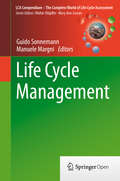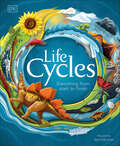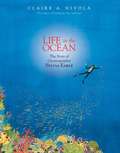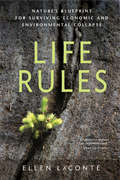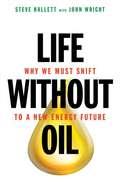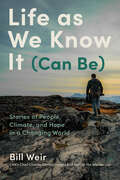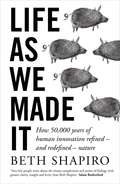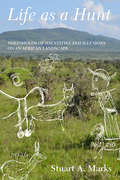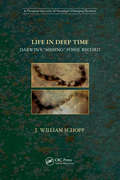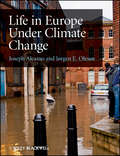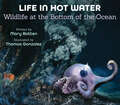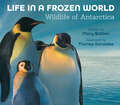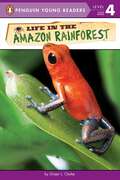- Table View
- List View
Life Cycle Design: An Experimental Tool for Designers (PoliTO Springer Series)
by Francesca ThiebatThis book proposes an economic and environmental assessment tool to help private and public building designers and owners determine the global sustainability value of green buildings from a life cycle perspective. As it demonstrates, sustainable life cycle tools for building design and construction can help to achieve successfully integrated architecture. The first part of the book defines the relationship between environmental and economic aspects in a sustainable design approach and illustrates how life cycle methodologies, including Life Cycle Assessment and Life Cycle Costing, can be applied to life cycle design. Further, it highlights methods for calculating costs from LCA data, taking into consideration both discounted cash flow and external costs. In turn, the second part of the book presents an experimental design model, the Life Cycle Design Model (LCDM), which is based on a life cycle design approach that can be used to produce two different outcomes based on two assessment levels. The first assessment level involves creating a grid, called a Design Matrix, which is useful in the design process. The second assessment level involves drawing on LCA and LCC results to develop a user-friendly tool for designers and other actors involved in the building process so that they can assess the most sustainable design option using €CO, a factor that combines the environmental and energy effects of the building system with time and costs. Selected case studies illustrate the practical application of life cycle analysis and show how reflecting the environmental impacts and costs can improve the sustainability of buildings. The LCDM represents a transdisciplinary tool for the design team and, at the same time, allows information on users’ needs and building performance to be communicated between experts and non-experts.
Life Cycle Management
by Guido Sonnemann Manuele MargniThis book provides insight into the Life Cycle Management (LCM) concept and the progress in its implementation. LCM is a management concept applied in industrial and service sectors to improve products and services, while enhancing the overall sustainability performance of business and its value chains. In this regard, LCM is an opportunity to differentiate through sustainability performance on the market place, working with all departments of a company such as research and development, procurement and marketing, and to enhance the collaboration with stakeholders along a company's value chain. LCM is used beyond short-term business success and aims at long-term achievements by minimizing environmental and socio-economic burden, while maximizing economic and social value.
Life Cycles: Everything from Start to Finish (DK Life Cycles)
by DKTake a look into the circle of life through the life cycles of the planet and everything on it!Everything begins and everything ends — but what happens in between? Find out in this stunning nature book. Learn about human life and development, processes in nature, how animals change over time, how the universe was formed and so much more. This illustrated children&’s book for ages 7-11 includes: • More than 60 life cycles featured • Stunning photographs that capture key moments during a life cycle, like penguin chicks huddling together to keep warm and the beauty of an orchid in full bloom • Bite-size facts and stats about every animal, plant, planet and habitat featured • A great new angle on the world, the universe and our place in it If you&’re looking for facts about the universe then this is the book for you! Based on key concepts found in the STEM learning curriculum, Life Cycles captures life on the planet through captivating illustrations and photography, amazing facts and easy-to-read text. You&’ll take a closer look at the life cycles of environments, and extinct animals like the dinosaurs, too! The life cycles in this reference book have been carefully chosen to give you an amazing overview of the universe, and how everything is linked. Discover a new life cycle every time you turn the page: how a river forms and changes over time, how a tree grows, see how coral reefs form. Follow the life cycles of weather — from the water cycle to ice ages, to give you a better idea of the climate change we find ourselves in now.From the single-celled amoeba, mountains, and volcanoes to continents, oceans and the solar system — take a deeper look into life on earth and all its intricacies!
Life Design for Women: Conscious Living as a Force for Positive Change
by Ariane BurgessA hands-on guide for designing a passionate, meaningful life that benefits you and the whole planet • Provides reflective visioning exercises and practical tools to help you examine your life as it is, the influences of your past, and the future you envision for yourself • Supports you to consciously weed out the thoughts and activities that get in the way of your authenticity and resonant heart • Helps you gain clarity in how to contribute more fully to a thriving regenerative future for both yourself and our world through your choices and actions When we choose to live more consciously, we benefit not only ourselves but all of life. In these turbulent times of transition and healing, women in particular are being called to reevaluate their lives and redirect their passion and actions toward purpose and meaning. By consciously redesigning our lives, we can reclaim our life force, connect more deeply with Nature and all life, and bring positive change to the world around us. Thus we become the true sovereign of our lives. Life Design for Women engages you in a simple, reflective visioning process to help you redesign your life to be more satisfying, meaningful, and aligned with your goals. Step by step, you will examine your life as it is, the influences of your past, and the future you envision for yourself. You will survey the domains of your life--from how you create &“home&” to your relationships with loved ones, food, your body, the Earth, and even Death. Applying the regenerative principles of sustainability to life design, author Ariane Burgess provides reflective exercises and practical tools to help you examine each of these domains, engage with natural systems, honor the feminine life force, and design your future. She shows how deep work in these areas gives you the resources needed to cut ties with the past and redirect your energy and passion toward your authentic purpose. You will learn to consciously weed out the thoughts and activities that get in the way of your resonant heart, take full responsibility for being the creator of your experiences, and make decisions that nurture your authentic self, rather than living your life through the dreams and fears of others. With this hands-on guide, you can reclaim your power through the Life Design process and choose to live more consciously. Gaining clarity on how you want to be, you bring well-being into your life and become a force for positive change, contributing to a thriving, regenerative future for life on Earth.
Life Finds a Way: What Evolution Teaches Us About Creativity
by Andreas WagnerHow the principles of biological innovation can help us overcome creative challenges in art, business, and scienceIn Life Finds a Way, biologist Andreas Wagner reveals the deep symmetry between innovation in biological evolution and human cultural creativity. Rarely is either a linear climb to perfection--instead, "progress" is typically marked by a sequence of peaks, plateaus, and pitfalls. For instance, in Picasso's forty-some iterations of Guernica, we see the same combination of small steps, incessant reshuffling, and large, almost reckless, leaps that characterize the way evolution transformed a dinosaur's grasping claw into a condor's soaring wing. By understanding these principles, we can also better realize our own creative potential to find new solutions to adversity.Ultimately, Life Finds a Way offers a new framework for the nature of creativity, enabling us to better adapt, grow, and change in art, business, or science--that is, in life.
Life From, For and To Water: Memoirs of Janos J. Bogardi (Springer Biographies)
by Janos J. BogardiThis book is translated from Hungarian. It was originally published as the sixth volume of the "Building the Future in Water Resources Management" series of the Water Science Council of the Hungarian Water Resources Management Directorate. It presents the water resources management of the last 50 plus years as seen, experienced, co-shaped and narrated by Janos Bogardi, a research professor of the Ludovika University of Public Service in Budapest. The author is simultaneously co-opted professor at the University of Bonn and distinguished adjunct professor of the Asian Institute of Technology, Pathumthani, Thailand. Born into a water resources engineering family and growing up in Budapest close to the Danube river pre-determined his professional orientation. He describes with light irony, and without the usual memoir style, his search for a fulfilling professional life. He discusses his engagement with the inter-university cooperation helping the transition of Central European universities earning him numerous academic recognitions. Dr. Bogardi’s career culminated with assignments as science diplomat and manager, working at UNESCO with local scientists in Central Asia, Russia and in Africa. He served as founding director of the UNU Institute for Environment and Human Security. The book concludes with reminiscences to those whose influence and collaboration shaped Dr. Bogardi’s career.
Life In The Ocean: The Story Of Oceanographer Sylvia Earle
by Claire A. NivolaSylvia Earle first lost her heart to the ocean as a young girl when she discovered the wonders of the Gulf of Mexico in her backyard. As an adult, she dives even deeper. Whether she's designing submersibles, swimming with the whales, or taking deep-water walks, Sylvia Earle has dedicated her life to learning more about what she calls "the blue heart of the planet." With stunningly detailed pictures of the wonders of the sea, Life in the Ocean tells the story of Sylvia's growing passion and how her ocean exploration and advocacy have made her known around the world. This picture book biography also includes an informative author's note that will motivate young environmentalists.
Life Rules
by Ellen LaconteCorporate capitalism has ravaged the planet the same way HIV ravages the human body, triggering a critical mass of cascading environmental, economic, social, and political crises. Economic and climate instability, collapsing ecosystems, peak fossil fuels, and devastating resource wars--if the Earth were a patient, her condition would be critical. Life Rules offers a comprehensive analysis of our present circumstances, combined with a holistic treatment protocol for restoring health to vulnerable human and natural communities. Predicting that Life will last, but if we don't make some fundamental changes, life as we know it--and a lot of us--won't, Life Rules identifies natural laws that have allowed non-human communities to thrive and prosper for several billion years, including: Local self-reliance Mutual interdependence Reliance on non-fossil sources of energy Resource conservation, sharing, and recycling Radically democratic self-organization and governance This sobering yet essentially optimistic manifesto is required reading for anyone concerned about our ability to live within Earth's means. A powerful tool for community transition and cultural transformation, Life Rules offers a solution to our global challenges that is at once authentically hopeful, deeply inspiring, and profoundly liberating. Ellen LaConte is acting director of the EarthWalk Alliance, a contributing editor to Green Horizon Magazine and The Ecozoic, a frequent talk show guest, and publisher of the Starting Point online newsletter. She has written two books about Helen and Scott Nearing, homesteaders and best-selling authors of Living the Good Life, and she is the author of the upcoming environmental novel Afton.
Life Sculpted: Tales of the Animals, Plants, and Fungi That Drill, Break, and Scrape to Shape the Earth
by Anthony J. Martin"There is much to love between this book’s covers. . . . There are many eureka moments in Life Sculpted—and some truly beautiful ones."—Eugenia Bone, Wall Street Journal Meet the menagerie of lifeforms that dig, crunch, bore, and otherwise reshape our planet. Did you know elephants dig ballroom-sized caves alongside volcanoes? Or that parrotfish chew coral reefs and poop sandy beaches? Or that our planet once hosted a five-ton dinosaur-crunching alligator cousin? In fact, almost since its fascinating start, life was boring. Billions of years ago bacteria, algae, and fungi began breaking down rocks in oceans, a role they still perform today. About a half-billion years ago, animal ancestors began drilling, scraping, gnawing, or breaking rocky seascapes. In turn, their descendants crunched through the materials of life itself—shells, wood, and bones. Today, such “bioeroders” continue to shape our planet—from the bacteria that devour our teeth to the mighty moon snail, always hunting for food, as evidenced by tiny snail-made boreholes in clams and other moon snails. There is no better guide to these lifeforms than Anthony J. Martin, a popular science author, paleontologist, and co-discoverer of the first known burrowing dinosaur. Following the crumbs of lichens, sponges, worms, clams, snails, octopi, barnacles, sea urchins, termites, beetles, fishes, dinosaurs, crocodilians, birds, elephants, and (of course) humans, Life Sculpted reveals how bioerosion expanded with the tree of life, becoming an essential part of how ecosystems function while reshaping the face of our planet. With vast knowledge and no small amount of whimsy, Martin uses paleontology, biology, and geology to reveal the awesome power of life’s chewing force. He provokes us to think deeply about the past and present of bioerosion, while also considering how knowledge of this history might aid us in mitigating and adapting to climate change in the future. Yes, Martin concedes, sometimes life can be hard—but life also makes everything less hard every day.
Life Stories: Well-Renowned Scientists Reflect on Their Lives and the Future of Life on Earth
by Heather Newbold"THIS BOOK IS FOR PEOPLE WHO WANT TO KNOW WHAT IS Happening to life on Earth-and to us. This knowledge is so important for our survival that I invited prominent scientists who investigate the planet's life-support system to tell their stories for our benefit. It is rare for scientists to discuss publicly their experiences, emotions, and beliefs because such expression is considered unscientific. This collection of personal and professional reflections is exceptional for its revelation of scientists' private lives and thoughts. Their profound understanding, appreciation, and reverence for life is inspirational and potentially transformative. We can experience it by following the development of their awareness, knowledge, and wisdom through their lives. These leading scientists began their careers in different scientific fields-in chemistry, nuclear physics, engineering, astronomy, and meteorology, as well as in the life sciences. In the forefront of their disciplines, they researched diverse aspects of the biosphere, yet reached convergent conclusions regarding the plight of our planet."
Life Underground: Tunnel into a World of Wildlife (DK Panorama)
by DKGo on an illustrated journey through nature&’s unseen habitats in this kids&’ book about life under the earth.Teeming with animal life, this book shows how life on Earth is interconnected and thriving in more places than you might think! Children aged 7-11 will be fascinated by what goes on under their feet, learning about the incredible diversity of life on planet Earth.Life Underground takes children on an illustrated journey into the world&’s most amazing underground habitats, from warm Arctic warrens to sandy desert dens. Explore the different communities of animals and plants that live under the Earth, from the succulent soil of an Australian forest to the hard ground at the icy north. Find out how animals and plants are adapted to their environment and how they interact with their surroundings and each other.This nature book for children offers: - Material that supports the science curriculum in schools up to Grades 3-5 – perfect for nature-loving children aged 7–11, and reluctant readers.- A look at Earth&’s major underground habitats and shows the animals that live there. - Beautifully detailed panoramic artworks show each underground scene teeming with life, with burrowing animals placed around the edge of the page for readers to find in the illustration.This illustrated guide lets children tunnel into a world of wildlife and explore different habitats, whilst teaching about different animal species and where they live. Details are drawn out from the artwork so that each habitat is easy to follow, making this the ideal nature book to have on your shelf.
Life Without Oil: Why We Must Shift to a New Energy Future
by John Wright Steve HallettHallett (botany and plant pathology, Purdue U. ), who is joined by John Wright, an energy and environmental journalist, contends that oil and natural gas supplies will wane by the end of the century and that society has failed to see this problem and act on it. He describes the history of the world in terms of energy use, how the petroleum interval of the last century fits into larger civilization, and how the rise of civilizations has been a story of human access to increasingly powerful sources of energy and that problems with access to energy have led to societal collapse. He examines problems that are likely to occur in different countries over the next half century, effects on the global economy, and what can be done about them it by considering nuclear power, reconnecting communities, focusing on sustainable agriculture, and recognizing that the laws of ecology override the economy. Annotation ©2011 Book News, Inc., Portland, OR (booknews.com)
Life as We Know It (Can Be): Stories of People, Climate, and Hope in a Changing World
by Bill WeirAward-winning journalist and CNN chief climate correspondent Bill Weir draws on his years of immersive travel and reporting to share the best ideas and stories of hope and positivity from the people and communities around the world who are thriving in the wake of climate change, and what we can learn from them to build a more promising future.While reporting from every state and every continent, and filming his acclaimed CNN Original Series The Wonder List, Bill Weir has spent decades telling the stories of unique people, places, cultures, and creatures on the brink of change. As the first Chief Climate Correspondent in network news, he’s immersed in the latest science and breakthroughs on the topic, while often on the frontlines of disasters, natural and manmade.In 2020, Bill began distilling these experiences into a series of Earth Day letters for his then-newborn son to read in 2050, to help him better understand the world he will have grown up in and be better prepared to embrace the future. Bill’s work and his letters were the inspiration for Life As We Know It (Can Be), which confronts the worry and wonder of climate change with messages and examples of hope for all of us on how a better future can still be written.Highlighting groundbreaking innovation in fields of clean energy, food and water sources, housing and building materials, and more, and touching on how happiness, resilience, and health and wellness factor into the topic of climate change, Bill’s stories take readers on a global journey, from one community in Florida that took on a hurricane and never lost power, to the Antarctic Peninsula where one species of penguin is showing us the key to survival, to the nuclear fusion labs where scientists are trying to build a star in a box. In these pages, we join a search for ancient wisdom and new ideas.Life As We Know It (Can Be) is a celebration of the wonders of our planet, a meditation on the human wants and needs that drive it out of balance, and an inspiration for communities to galvanize around nature and each other as the very best way to best prepare and plan for what’s next.
Life as We Made It: How 50,000 years of human innovation refined – and redefined – nature
by Beth ShapiroFrom the very first dog to glowing fish and designer pigs – the human history of remaking nature. Virus-free mosquitoes, resurrected dinosaurs, designer humans – such is the power of the science of tomorrow. But this idea that we have only recently begun to manipulate the natural world is false. We&’ve been meddling with nature since the last ice age. It&’s just that we&’re getting better at it – a lot better. Drawing on decades of research, Beth Shapiro reveals the surprisingly long history of human intervention in evolution through hunting, domesticating, polluting, hybridizing, conserving and genetically modifying life on Earth. Looking ahead to the future, she casts aside the scaremongering myths on the dangers of interference, and outlines the true risks and incredible opportunities that new biotechnologies will offer us in the years ahead. Not only do they present us with the chance to improve our own lives, but they increase the likelihood that we will continue to live in a rich and biologically diverse world.
Life as a Hunt: Thresholds of Identities and Illusions on an African Landscape
by Stuart MarksThe "extensive wilderness" of Zambia's central Luangwa Valley is the homeland of the Valley Bisa whose cultural practices have enriched this environment for centuries. Beginning with the intrusions of warlords and later British colonials, successive generations have experienced the callousness and challenges of colonialism. Their homeland, a slender corridor surrounded by three national parks and an escarpment, is a microcosm of the political, economic and cultural battlefields surrounding most African protected areas today. The story of the Valley Bisa diverges from the myths that conservationists, administrators, and philanthropists, tell about Africa's environmental and wildlife crises.
Life from Above: Epic Stories of the Natural World
by Michael Bright Chloe SaroshWith over 200 spectacular images, including astonishing satellite photographs and stills from the PBS docuseries, Life from Above reveals our planet as you've never seen it before.Thanks to advanced satellite images, we can now see the earth's surface, its megastructures, weather patterns, and natural wonders in breathtaking detail. From the colors and patterns that make up our planet to the mass migrations and seismic changes that shape it, Life from Above sheds new light on the place we call home. It reveals the intimate stories behind the images, following herds of elephants crossing the plains of Africa and turtles traveling on ocean currents that are invisible unless seen from space. The true colors of our planet are revealed, from the striped tulip fields of Holland to the vivid turquoise lakes in Iceland to the green swirl of a plankton super bloom attracting a marine feeding frenzy. Whether it's the world's largest beaver dam--so remote it was discovered only through satellite imagery--or newly formed islands born from volcanic eruptions, you'll discover new perspectives with every image.
Life in Colour: How Animals See the World
by Dr. Martin StevensBeauty is more than skin deep.'The natural world is awash with colour, but we are only seeing half the story. If we could see things as animals do, our world would become unimaginably brighter. Now, thanks to new science and technology, we can at last open our eyes.' - Sir David AttenboroughIn nature, colour is more than a source of beauty; it's a form of vital communication. Depending on the situation, colour says different things - it can be an expression of power or seduction, warning or deceit - and it can even, occasionally, save your life. Accompanying a major new BBC series with David Attenborough, Life in Colour explores the fascinating story of how colour works in the natural world. From the 'trichromatic' vision of Silver Leaf Langurs, which allows them to see orange and red against forest foliage - the colours not only of ripe fruit, but of their young - to African Mandrills who use their colouration to do battle, Professor Martin Stevens reveals a complex system of messaging visible only to those who know the code.Based on the latest scientific research in the field, and illustrated with stunning photography throughout, Life in Colour reveals a world previously unknown to us.
Life in Deep Time: Darwin’s “Missing” Fossil Record
by J. William SchopfWhen Darwin wrote his Origin of Species, one of his main concerns was with the perceived shortness of the fossil record of life. Until the work of J. William Schopf and his colleagues, much of this history was thought to be unknowable. This book, through a memoire of Schopf’s personal recollections, documents astonishing discoveries revealing the first 85% of the history of life. These earliest periods of life on Earth emerge as a tale of individual and internationally collaborative exploration told by a scholar whose 60 years of research contributed to the recognition of the richness and diversity which forms the foundation of today’s biodiversity. Key Features Documents, through personal narrative, a paradigm shift is the study of the earliest life Summarizes a fossil record largely unknown until relatively recently Addresses one of Darwin's most troubling concerns about his theory of natural selection Predicts future developments in the study of first life
Life in Europe Under Climate Change
by Joseph Alcamo Jorgen E. OlesenLife in Europe will indeed go on as the climate changes, but not in the same way as before. The air will be warmer, winds will change, patterns of rainfall and snowfall will alter, and sea level is likely to rise. These phenomena are already being seen. Europe will in the future experience marked changes in vegetation cover, increased floods along rivers and coastlines as well as more frequent droughts and forest fires, often leading to large societal costs. The changes will be minor in some cases, profound in others, but in any case, pervasive. This book uses the most up to date information issued by the IPCC (Intergovernmental Panel on Climate Change), and informs readers about these effects, as well as showing how Europe is contributing to attempts to slow the tempo of global climate change, and how it can adapt to the climate change that seems unavoidable. Life in Europe under Climate Change makes essential information on climate impacts in Europe accessible to a broad audience, including students, politicians, planners and members of non-governmental organizations.
Life in Hot Water: Wildlife at the Bottom of the Ocean
by Mary BattenA dramatic overview of the deep-sea extremophiles that thrive in scalding water and permanent darkness at the bottom of the oceanThe scalding-hot water gushing from vents at the bottom of the ocean is one of the most extreme environments on Earth. Yet over millions of years, many organisms—from chemical-eating bacteria to eyeless crabs and iron-shelled snails—have evolved in amazing ways that enable them to thrive in this unlikely habitat. Scientists are hard at work to learn more about the complex ecosystems of the ocean depths.Award-winning science writer Mary Batten and New York Times best-selling illustrator Thomas Gonzalez, the masterful duo that created Life in a Frozen World, team up again in this impressive overview of hydrothermal ocean vents. Her clear, informative text coupled with his unique and eerily realistic paintings of sights never seen on land—gushing "black smokers," ghostly blind shrimp, red-plumed tube worms—will entice readers to learn more about this once-hidden world at the bottom of the sea.
Life in Space: Astrobiology for Nonscientists
by Amri Wandel Joseph GaleOver the last two decades alone, new technology and space missions have profoundly changed our understanding of prospective extraterrestrial life in the universe. The resulting field of astrobiology has become a highly eclectic and interdisciplinary pursuit, encompassing many of the natural sciences and holding ramifications for nearly all other areas of study. Co-written by an astrophysicist and a biologist, this introductory undergraduate textbook presents an overview of astrobiology for students from all backgrounds. Addressed in its chapters are the recent detection of potentially habitable planets and the prospects for detecting biosignatures and life; the celestial and geological factors that enabled the appearance and evolution of life on Earth; and other factors that continue to affect life up to the present, such as climate change. Based on over twenty years of university coursework, and in particular the authors’ own interdisciplinary astrobiology curriculum, the text is accessible not just for the budding science major, but for any undergraduate student or lay reader excited by the prospect of life in the universe.
Life in Sync: The Science of Internal Clocks and How We’re Disrupting Them
by Philippa GanderWhy we need to reconnect with nature&’s biological rhythms—and rediscover the benefits of a good night&’s sleepAll of life is profoundly shaped by the daily, monthly, and yearly cycles of our planet, and all creatures have internal timekeeping systems that rely on cues from the surrounding environment. With modern technology, we are changing our environments—and by proxy, the ecosystems around us—to override these innate rhythms of life. But at what cost? Life in Sync reveals how Earth&’s rotations shape our biology, what human sleep cycles looked like before the advent of artificial light, and why technology can&’t free us from the constraints of our circadian clocks.Philippa Gander explores the science behind the biological rhythms that animate us and our world, blending captivating storytelling with illuminating examples ranging from migratory birds and hibernating squirrels to jet-lagged pilots and astronauts in space. She shows how genetic circadian clocks are an ancient evolutionary adaptation that we share with all life on the planet, and how our rapidly expanding use of artificial light at night disrupts the time cues for entire ecosystems. Gander explains why cutting back on sleep adversely affects our well-being, safety, and longevity, and how breakthroughs in sleep science offer solutions to bring our lives more in harmony with nature&’s rhythms.An astonishing journey of scientific discovery, Life in Sync unlocks the mysteries of biological time—and offers new perspectives for anyone who has ever given up a good night&’s sleep for the sake of their hectic waking hours.
Life in a Frozen World: Wildlife of Antarctica
by Mary BattenAntarctica is one of the most extreme environments on Earth—the coldest, windiest, driest place on the planet. This frozen continent affects weather, ocean currents, and sea levels all over the Earth.From award-winning, experienced nature writer Mary Batten comes a remarkable nonfiction picture book that plumbs the mysteries of this hostile environment. With clear, engaging language, Batten explores fascinating questions that scientists the world over have been researching, such as how a wide variety of wildlife can survive in this frigid environment and how Antarctica might be the key to long-standing questions about the Earth and climate change.New York Times bestselling illustrator Thomas Gonzalez brings Batten's text to life with detailed, realistic paintings. An ideal resource for young science lovers and educators, this informative volume is perfect for classroom units on climate change, conservation, ecology, oceanography, and more.
Life in a Rainforest
by Amy TaoDo you know how many animals live in the Amazonian rainforest? Learn about the different predators and prey that coexist and depend on one another to survive in their ecosystem.
Life in the Amazon Rainforest (Penguin Young Readers, Level 4)
by Ginjer L. ClarkeJourney through the jungle in this fact-packed leveled reader!Welcome to the largest rainforest in the world, a vast wonder just waiting for you to explore. Follow along as pink dolphins dart through the flooded river, vampire bats swoop down from the trees, and giant green anacondas slowly slither across the forest floor. This humongous habitat is home to millions of plants, animals, and people. But large as it may be, the Amazon Rainforest is in danger--and shrinking fast. Learn more about this amazing place and discover what you can do to help save the rainforest!

